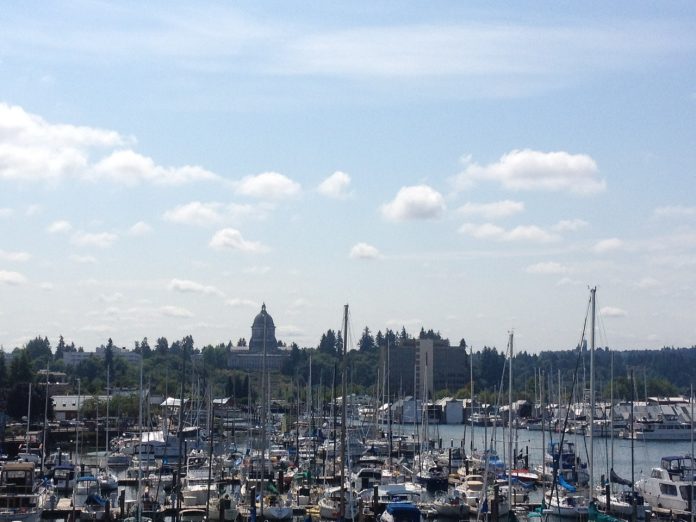On Wednesday, the state Economic and Revenue Forecast Council released its updated revenue forecast, and in doing so kicked off one of the most important battles over the state’s tax system we’ve seen in nearly 90 years.
The forecast suggests the state will be short $4.5 billion by the end of the current fiscal year in June 2021, and another $4.3 billion by the end of the next biennium in June 2023. The media headlines of a $9 billion budget deficit make this sound dire, and when that happens many residents assume there’s no other option but to make huge cuts.
But that is changing. More than 70 progressive and community organizations are calling for new revenues and a rejection of austerity thinking. And there is increasing awareness in the state legislature about the horrific impact of budget cuts on our society and especially on racial equity, and new leaders are ready to challenge the conventional wisdom that austerity is the only path.
Representative Debra Entenman, who flipped a Kent district from red to blue in 2018, told Crosscut’s Melissa Santos that “I ran for the Legislature in 2018 to undo many of the things that were done in 2009…I don’t want us in the future to have to do what we’ve done in the past, because we thought we needed to go into austerity measures.”
A new letter from Washington State economic and policy researchers makes a similar point, arguing strongly against austerity and for taxing the rich as the only responsible path to solving the crisis. Pointing out that “[s]ignificant cuts in government spending and investment in public projects and infrastructure will especially impact workers and families of color,” they conclude “tax and spending cuts often fail to stimulate spending as promised. Ensuring the wealthiest pay for investments is the most productive and effective way to kickstart economic recovery and rebuild the state’s economy.”
If schools are to reopen safely this fall, if jobs and small businesses are to recover from the pandemic, and if Washington State is going to take racial justice seriously, the state legislature cannot turn to austerity again.
A closer look at the budget shows that the deficit, especially the shortfall for the rest of the 2019-2021 biennium, can be closed without resorting to austerity. The immediate number legislators need to focus on is the estimated $4.5 billion shortfall over the next 12 months. The collapse in state revenues, led by a $2.5 billion decline in sales tax receipts, creates the possibility of a cash flow crisis.
Governor Jay Inslee announced suspension of pay increases and imposed furloughs for state workers as part of his efforts to respond to the budget crisis. But in a recession caused by a collapse in consumer spending due to the pandemic, slashing workers’ wages like this runs the risk of fueling a deflationary spiral that would ensure the recession becomes a long-term depression.
The first and most obvious step for legislators is to tap the budget stabilization account, which currently has about $3 billion in funds. This would go a long way toward backfilling lost revenues, leaving just $1.5 billion to find to get the state through the end of the fiscal year. Predictably, Republicans called for massive spending cuts, but that seems unlikely. In recent weeks, Democrats have begun pivoting away from claims that the budget deficit would have to be closed through cuts, and are instead calling for a mix of cuts and new revenues. That’s a small step in the right direction, but there are numerous proposals out there that can provide the remaining $1.5 billion without needing further cuts.
Progressive legislators already plan to push proposals to tax the rich that have languished in Olympia in recent years but are finding new life amidst one of the worst economic crises in state history. Senator Joe Nguyen of West Seattle is calling for a capital gains tax and a new tax on companies that pay people salaries in excess of $1 million per year. Senator Liz Lovelett of Anacortes is proposing a bill to increase taxes on large estates.
Even Frank Chopp, who failed to get progressive tax reform achieved when he was Speaker of the House for 18 years, is out with a plan to raise $2 billion in new revenue, with progressive challengers Jessi Murray and Sherae Lascelles pledging to go even further if they defeat him in November.
One problem is that it will take time for the state to begin collecting these new revenues. But the state has the power to borrow money to cover the difference. Unlike many other states, Washington does not have a constitutional requirement to balance its budget. That rule exists only in statute, adopted in 2012 in a fit of deficit panic.
This is no time for the state to limit its options by insisting on a four year balanced budget. There are simply too many unknowns ahead, and the need is immediate. Legislators can and should repeal the balanced budget law and explore ways to borrow money to bridge the distance between today and the day that new taxes on the rich and large corporations can be collected. Now is a good time to do this, as states are seeing record low interest rates when their bonds go to auction.
Another battleground will be whether to anticipate additional federal aid for state governments in order to avert cuts. Democratic leaders in the California legislature have vowed to pass a “no cuts” budget that relies on closing tax loopholes, as well as deferring any cuts to later in the year in the event the federal government doesn’t provide more stimulus. But one Washington Democratic leader, Representative Pat Sullivan, appeared to throw cold water on that strategy, saying the state legislature cannot count on assistance from the federal government.
This is shortsighted. Though many Democrats with bad memories of 2016 are hesitant to believe it, polls show Joe Biden has a “commanding lead” in the 2020 election and is likely to be our next president. Democrats are also heavily favored to take the United States Senate.
Though there’s always the risk that Trump and the Republicans pull out another unexpected victory, there’s no reason for Washington’s legislators to slash funding for public schools, health care, social services, and climate justice right now. A major federal economic stimulus with aid to state governments seems likely by February 2021 at the latest. Slashing spending now, cutting off any chance of economic recovery, would be a reckless act by the state legislature.
Polls also show that Washington State residents want to tax the rich to prevent budget cuts. This is significant in the event that Republicans and anti-tax ideologues try to repeal any new taxes at the ballot box, and should help give legislators even more confidence to reject austerity thinking and embrace new, progressive revenues.
Washington’s current tax system dates largely to the 1930s, when a right-wing state supreme court threw out a voter-approved income tax and legislators responded by hastily crafting a rickety system based on sales, property, and business and occupations taxes. In the worst economic crisis since the Great Depression, the state legislature has a chance to stop destructive cuts and finally fix the broken tax system with new taxes on the rich and big corporations. The next few months will determine whether they seize that moment.

Robert Cruickshank
Robert is the Director of Digital Strategy at California YIMBY and Chair of Sierra Club Seattle. A long time communications and political strategist, he was Senior Communications Advisor to Seattle Mayor Mike McGinn from 2011-2013.

